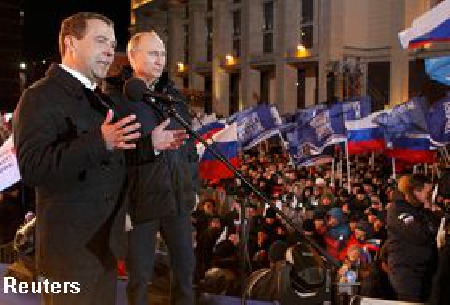An Election with a Predictable Outcome
The election of Vladimir Putin for a third term in the Kremlin came as no surprise for anybody. Putin was ahead in every opinion poll published before the presidential election at the beginning of March, eventually winning it in a landslide with nearly 65

Eugen Cojocariu, 29.04.2012, 18:39
The election of Vladimir Putin for a third term in the Kremlin came as no surprise for anybody. Putin was ahead in every opinion poll published before the presidential election at the beginning of March, eventually winning it in a landslide with nearly 65% of the votes.
The OSCE observers noted, however, a number of irregularities related to the vote count and said the election campaign was “clearly skewed” in favour of Putin, who has served as Russia’s prime minister for the last four years. The suspicion of fraud gave rise to massive protests in some of Russia’s biggest cities. Radio Romania’s correspondent to Russia, Alexander Beleavschi, has more:
“Most protesters come from the so-called middle class, especially in the big cities. They are, however, a minority compared to the number of people who continue to support the regime. Few protesters belong to a party or movement, while their political preferences are often eclectic and confused. They don’t have a clear leader or a clear ideology. Most protesters are financially independent and are active as far as information networks are concerned, including social networks and other modern networks, being therefore also socially active and able to identify the flaws of the political system built by Putin.
Paradoxically, those people are in fact the direct beneficiaries of the period of growth and stability, which Putin says is the great achievement of his term in office. At the same time, they have been excluded from the political and social life by the authoritarian regime, which ignored their demands for greater democracy, including fair elections, the freedom of the press, an independent justice system and the eradication of corruption and abuses, all of which benefit from the complicity of the regime and are defended by its law enforcement apparatus.”
As for Putin’s new term as president, political analysts wonder if this time he will be able to engage in a dialogue with this disgruntled part of Russian society. Citing his pragmatism and ability to adapt, pundits say Putin is capable of facing the new realities and implement the reforms requested by an increasing number of Russians. Some analysts however are not convinced that Putin will be able to improve, and even believe that he may not be able to pull through the entire duration of his six-year term.
As for Moscow’s foreign policy, Putin made statements a few days before the election that brought him his third term as president. In an article carried by Moskovskye Novosti, entitled ‘Russia and a changing world’, he underscored that foreign policy objectives had a strategic character related to the unique role that Moscow plays in the world. Among other things, the Russian leader would like a harmonious economic community, from Lisbon to Vladivostok. He said that “Russia is a part of this great world, economically, from an information point of view, and culturally. We cannot and would not isolate ourselves. We hope our opening will bring well-being to the citizens of Russia, and will consolidate trust, which is a dwindling resource nowadays”.
Putin said that Moscow would be consistent in its foreign policy, based on its own interests and purposes. He claimed that Moscow would continue to consolidate security, would reject confrontation, and would fight challenges such as nuclear proliferation, regional conflicts and crises, terrorism and drugs. NATO enlargement, the deployment of new elements of military infrastructure and the plan to set up an anti-ballistic missile shield in Europe are also things that Russia will continue to keep an eye on. NATO Secretary General Anders Fogh Rasmussen said he hoped there would be continuity in the alliance’s relationship with Moscow.
Speaking of the negotiations on his organization’s anti-ballistic missile shield, in the run up to the NATO summit due in Chicago in May, he said: “We hope we can make progress, especially in anti-ballistic missile defence. We believe that both NATO and Russia can take advantage of this cooperation”
What are the effects of the presidential election in Russia on Romanian- Russian relations over the upcoming years? Dan Dungaciu, head of the Institute for International Relations in the Romanian Academy, said that Romanian-Russian relations need to find a new basis:
“This resetting of the bilateral relationship also depends on resetting or re-evaluating Russia’s relations with the political or geopolitical entities that Romania is a part of. It isn’t very clear how the EU will relate to the Russian Federation, or how the most important player in the EU, Germany, will relate to it. It is also unclear how NATO will relate to the Russian Federation, or how the US will. Romania has special partnerships with all those entities, or is a member of those entities and so Romania cannot be alone in this bilateral relationship, and has never truly been alone”.
There is a question mark here, said Dungaciu, and Russia’s moves bear watching, but what also bears watching are the moves of the other big players on the world scene.






























